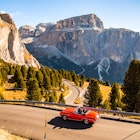
Italy requires more travelers get tested for COVID-19 before visiting
Oct 12, 2020 • 2 min read

Travelers to Italy from certain countries will have to have a negative COVID test © Brian Kinney/Shutterstock
Italy has expanded its list of high-risk countries from which travelers must get tested for COVID-19. Those arriving into the country need to demonstrate that they have taken a test and received a negative result during the previous 72 hours, or they will have to take a test within 48 hours of arrival.
The new rule applies to those who have come from, or stayed in Belgium, France, the Netherlands, the UK, Northern Ireland, the Czech Republic and Spain in the previous 14 days. The measure has come into effect because Italian health minister, Roberto Speranza, signed a new ordinance, which provides for urgent measures to contain and manage the health emergency.
Travelers will need to undergo the test upon arrival at the airport, port or border area, where possible. If not, they must take it within 48 hours of entering at a local health authority and must self-isolate in the meantime at their home or place of residence. They must also promptly report any symptoms they are experiencing to the health authority through dedicated telephone numbers. Those who test positive will be required to quarantine.
Could this new digital health pass help kickstart international travel?
The measure comes as infections climb to levels last seen in the country in March. To curb the spread, Speranza is also proposing a nationwide ban on private parties, while Rome will also address opening hours for bars and restaurants. “Now we need a change of pace, and to intervene with measures, not comparable to those adopted in the past, which could allow us to put the contagion under control and avoid tougher measures later on,” he said in an interview with RAI state TV.
You might also like:
How to prepare for your first post-COVID trip
This airport has been awarded the world's first five-star anti-COVID rating
Coronavirus-sniffing dogs are putting their noses to work in airports
Explore related stories









